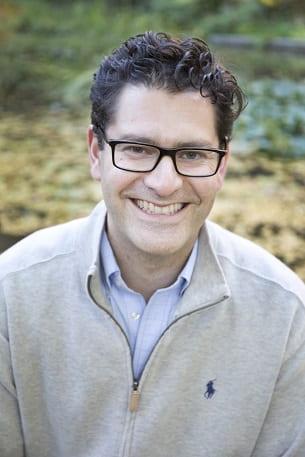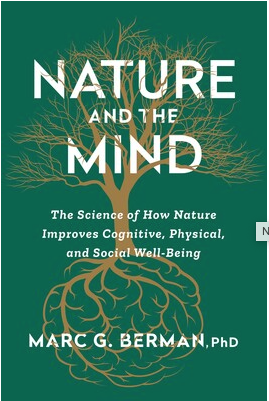Marc Berman Thinks You Should Take a Walk in the Park
In his upcoming book, Nature and the Mind, the psychology professor uses research to show the cognitive benefits of spending time with nature, which just might lead to a happier, healthier, and safer society.

“I love nature, but I'm not hiking the Appalachian Trail solo. I'm not climbing mountains. I don't like camping, really.”
Marc Berman, Professor in the Department of Psychology, makes these declarations ahead of the publication of his latest book, Nature and the Mind: The Science of How Nature Improves Cognitive, Physical, and Social Well-Being (coming August 2025 from Simon Element/S&S). It’s an important point to underscore, he says, because he wants the book to be for everyone, not just those who already love nature. In fact, he’s not even interested in convincing anyone to love it: The real goal is for everyone to value nature more.
“It's more than just a nature book,” he says. “It tells us about human psychology in relation to the environment, and that nature is a big part of that. I don't think we can really understand our brains and our psychology without really considering the environment. We evolved in nature, we spent thousands and thousands of years in nature. The time period that we're in now, where we live in these cubicles, is very new — and probably not the optimal environment for us.”
Nature and the Mind makes the case for viewing nature not as an amenity, but as a necessity. Berman appeals to readers’ self-regard, and backs his arguments with rigorous scientific research. The book also shows his own journey to valuing nature.
Despite earning a Bachelor of Science in Engineering at the University of Michigan, Berman found himself drawn instead to psychology. He learned about the Milgram experiment — which demonstrated how people tend to obey orders from authority figures, even when those orders are harmful — which he viewed as not just a social situation, but as an environmental situation. Moving deeper into the field, he then learned about Kurt Lewin’s theory that human behavior is a function of the person and their environment; Donald Hebb’s study showing rats raised as pets performed better on many cognitive tasks than rats raised in laboratory cages; and his own teacher Steve Kaplan’s attention restoration theory, which asserts that people can concentrate better after spending time in nature, or even looking at scenes of nature.
“I just thought, wow, that combination of things seemed pretty awesome,” Berman recalls. “I started to go into nature, to the Ann Arbor Arboretum and the Ann Arbor botanical gardens or Barton Park in Ann Arbor when I was in grad school when I'd be tired out or fatigued. I would start using nature to restore my attention.”

Berman began working in Douglas C. Noll’s laboratory at Michigan in an engineering role, improving the MRI machine used in Noll’s experiments. Noticing Berman’s interest in psychology, Noll introduced Berman to cognitive neuroscientist John Jonides, who asked him to work in his own lab.
“By having this background in fMRI and cognitive neuroscience, I tried to smash that together with the environmental psychology research,” Berman says. “Okay: Can we make this nature research more rigorous?”
With these foundational studies and theories in mind, Berman directs readers of Nature and the Mind to an important fact: Humans are very good at controlling their attention; however, this ability is fatigable or depletable — we can only do it for so long before we become mentally fatigued. He gives the example of how someone might feel at the end of a long work day, staring at the computer screen but not making any progress. This is referred to as a directed attention fatigue state.
In Berman and Kaplan’s research, they suggest that direct attention underlies many human behaviors, including our ability to control impulses or plan for the future. When directed attention is fatigued, it can have negative effects on many levels — including our becoming more aggressive, irritable, or planning poorly.
“It’s really important that our directed attention bank is full,” Berman says. “When it gets depleted, we have to do things to restore it, and a lot of the activities that humans do to restore direct detention aren't really that restful — watching TV, surfing the web, streaming, texting. We are a little bit worried that, as a species, we’re maybe getting into a directed attention crisis.”
He, Kaplan, and Jonides published an article in Psychological Science in 2008 that found a 50-minute walk in nature could improve a person’s ability to direct attention by 20%, versus a walk in a more urban environment. Their 2012 article in Journal of Affective Disorders similarly found enormous benefits of brief walks in nature for people who have been diagnosed with clinical depression.
Berman uses research to drive home his argument that nature is necessary for a positively functioning person and society. Another example he uses in the book is a 2001 Environment and Behavior study that found Chicago Public Housing residences with window views of modest nature had less aggression and crime in those apartments, compared with their counterparts in the same projects without such views.Researchers theorized that this decrease in aggression was due to residents’ directed attention improving. Similarly, Berman’s own 2021 study in Urban Sustainability used cell phone trace data from Chicago and New York City to find that in neighborhoods where people visit parks more often, there's less crime — even when you control for age, education, ethnicity, and other variables.
“It seems like having more nature nearby improves physical health, it improves mental health, it improves productivity, it reduces aggression — and that might lead to people getting along better with one another at pretty big scales,” Berman says.
All the research Berman cites in Nature and the Mind leads to action items for the reader, the most basic of which is to spend more time in nature. In fact, you don’t even have to enjoy the experience to receive the benefits (an early study from Berman found the same memory and attention benefits with a 20-degree walk in January as with a lovely 80-degree walk in June). Plus, you don’t even need to leave your home to reap the cognitive benefits of nature: Houseplants, photographs of nature, and nature sounds can all help.
But why turn all this research into a book for the masses? After nudges from colleagues and friends, he saw collecting all the information he’s gathered over the years into a book as an opportunity to spark change — and maybe even something of a revolution.
“It's not just about nature, but our environment in general,” Berman says. “We've built the environment to move goods efficiently, house people efficiently. But we haven't built the world to make people more cooperative, or to make people have better working memory, or make people have better cardiovascular health.”
While he does call for a reaping nature’s myriad benefits on a larger scale — redesigning schools, offices, cities, or how we even arrange our days — it all starts simply. Here, he references UChicago economist Richard Thaler, who said, “If you want people to do something, make it easy.” Berman isn’t asking anyone to climb the Rocky Mountains, he just thinks you should visit your local park.
 THE UNIVERSITY OF CHICAGO
THE UNIVERSITY OF CHICAGO

